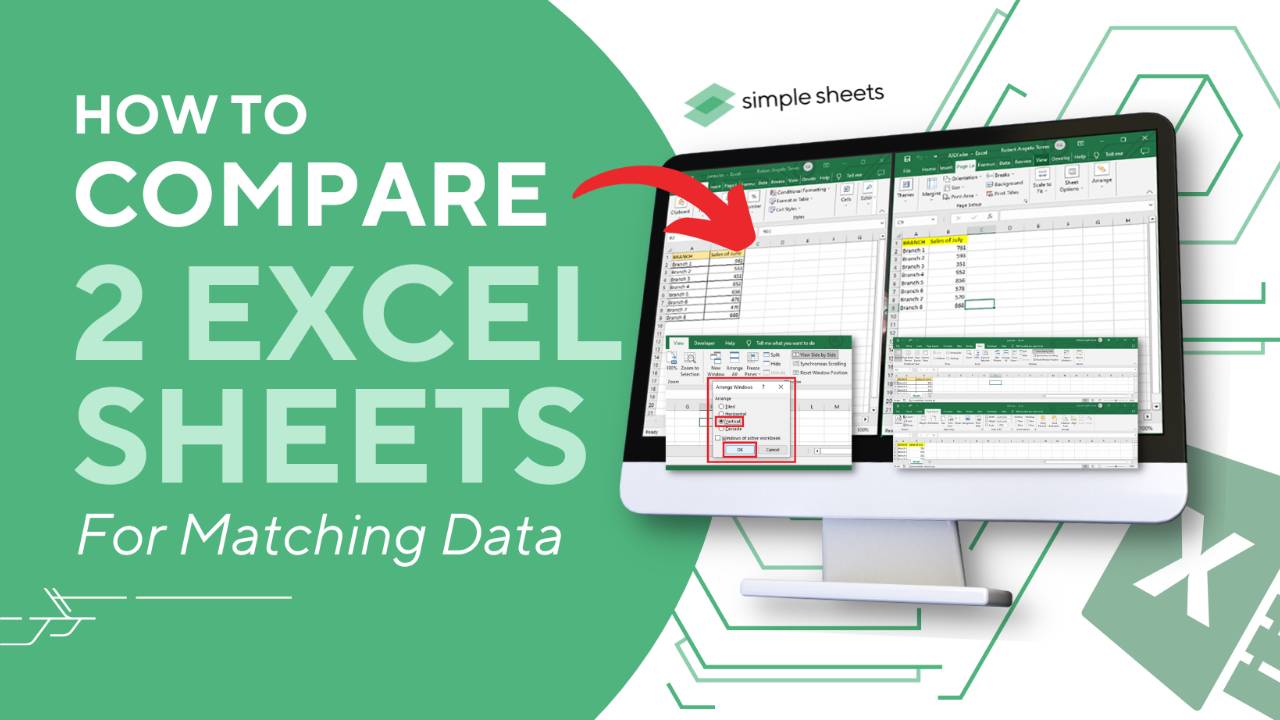Match Two Excel Sheets: A Simple Guide

The use of Excel for data comparison is crucial for various data-driven tasks, whether you're managing finances, inventory, or human resources. Here, we'll explore several methods to match two sheets in Excel, ensuring your data stays clean and your decisions, reliable.
Understanding Excel Sheets Matching

Excel provides several functionalities to compare and match data between sheets. Before diving into the steps, let's understand the term:
- Sheet Matching: This refers to the process of comparing two or more Excel sheets to find similar or differing values, typically based on a key column or multiple criteria.
- Key Columns: A unique identifier used to match rows across sheets, like an employee ID or SKU number.
To match sheets effectively, knowing your data structure and what you aim to achieve is vital. Here are some common matching scenarios:
- Identifying duplicates or unique entries.
- Finding discrepancies in data sets.
- Validating data accuracy or updates across multiple sheets.
Method 1: Using VLOOKUP for Basic Matching

VLOOKUP, or Vertical Lookup, is one of the simplest functions for matching data:
- Choose a cell in your destination sheet where you want the results to appear.
- Type in the VLOOKUP formula:
=VLOOKUP(lookup_value, table_array, col_index_num, [range_lookup]) - Replace
lookup_valuewith your key column reference from the sheet you're comparing. table_arrayshould reference the other sheet and its columns to search within.col_index_numspecifies the column number where your matching data exists.range_lookupcan be TRUE for approximate matches or FALSE for exact matches.
🔔 Note: Ensure your key columns are formatted identically for accurate matching.
Method 2: Conditional Formatting for Visual Comparison

Conditional Formatting allows you to visually match data:
- Select the range in the first sheet where you want to highlight matches.
- From the Home tab, choose Conditional Formatting, then New Rule.
- Select Use a formula to determine which cells to format.
- Enter a formula like
=COUNTIF(Sheet2!A:A, A1)>0to highlight cells where the value exists in Sheet2. - Choose a format (color or icon) to highlight the matches.
🔔 Note: This method helps in identifying matches or discrepancies visually but does not automate the matching process.
Method 3: Advanced Matching with INDEX/MATCH

INDEX/MATCH provides a more flexible matching solution:
- In the cell where you want results, enter the formula:
=INDEX(Sheet2!A:B, MATCH(A1, Sheet2!A:A, 0), 2) - Here,
A1is your lookup value from your current sheet. Sheet2!A:Ais the column on Sheet2 you're searching for matches.Sheet2!A:Bincludes the entire table to return a value from.
🔔 Note: This method is more robust than VLOOKUP, especially if you're adding columns or when you need matches to be returned from left to right.
Method 4: Using Power Query for Data Transformation

Power Query, part of Excel's data tools, can transform, merge, and match data:
- From the Data tab, select Get Data > From Other Sources > Blank Query.
- In the Query Editor, use Combine Queries > Merge to join your two sheets.
- Select the key column for matching, choose the join type, and load the result into your workbook.
🔔 Note: Power Query excels at handling large datasets and complex matching criteria, but it has a learning curve.
FAQs About Matching Excel Sheets

What if my data doesn't have a unique key column?

+
Without a unique key, you can use multiple columns for matching or use functions like CONCATENATE to create one. Alternatively, consider using approximate matches or manual validation.
Can I match data from multiple sheets to one?

+
Yes, using Power Query or advanced Excel formulas like INDEX/MATCH combined with IF statements, you can merge data from multiple sheets into one sheet.
How do I deal with mismatches or missing data?

+
Use Conditional Formatting to highlight discrepancies or missing entries. Then, manually verify and correct the data or investigate data sources for accuracy.
Throughout this guide, we've explored several effective methods to match data across two Excel sheets. From basic VLOOKUP functions to advanced Power Query solutions, each method has its strengths, tailored to different scenarios and data complexity. By leveraging these techniques, you can streamline your data management process, reduce errors, and enhance your decision-making capabilities.
Remember to always test your matches in a controlled environment before making large-scale changes or decisions based on matched data. Additionally, consistent formatting and clean data preparation will ensure the accuracy of your matches, making your Excel workflow more efficient and reliable.



